Waking Up To Reality: The End of Denial
The unraveling is already happening, and now each of us has a choice: wake up or disappear into delusion.
In this article, I’ll share how I woke up to the reality of our predicament. Then I’ll explore some of the psychology and neuroscience behind why so few of us can see it (it’s not exactly a conscious choice), and how that blindness is fueling denial, conspiracy thinking, and rising authoritarianism, a pattern that’s becoming harder to ignore.
These are thoughts I had at the time, as the events unfolded. My understanding of them has changed significantly since then.
For me, things started to wobble in 2016 with Brexit and Trump.
Up until then I had believed in things like “competent leadership”, “smart people are working on these issues”, and “we’ll probably solve this climate thing”. You know the comforting idea that things are under control.
But then the world said NOT REALLY.
First came Brexit. It was a giant middle finger to the EU and the political establishment. People were upset about immigration, rising costs, low wages, and housing shortages, and were told that leaving the EU would fix all that, so Brexit passed (barely).
Of course, it didn’t fix anything. Because it was never going to. And honestly, I doubt the UK would be thriving today even if they had stayed.
Then came Donald Trump.
Trump was different. From the moment he came down that gold escalator, he was ranting about immigrants being criminals, job-stealers, and a threat to “real” American culture. He promised to BUILD THE WALL, ban Muslims, and deport millions. He said things normal politicians wouldn’t dare, but also lied openly and shamelessly. I mean, he just made shit up!
His narcissism and ignorance were so over the top, it was almost impressive. He called climate change a hoax, mocked disabled people, pushed racist conspiracy theories like Obama “Birther” lie, and bragged about sexual assault.
Any one of these scandals would have ended a normal political career (at the time). But Trump supporters didn’t care about any of that. Even with his long list of scams and failed business ventures like fake universities, unpaid contractors, fraudulent charities, and several bankruptcies, people looked at him and said “Yup, this is our guy”.
It was like a car crash: nobody could look away. Every absurd thing he said became a headline. The ratings were incredible, so the media gave him the mic and just let him run with it.
“It may not be good for America, but it’s damn good for CBS. The money’s rolling in, and this is fun.”
– Les Moonves, former CEO of CBS
Then he won.
When he got elected, it became clear that we do not have competent people in charge. We do not have smart people working on our most pressing issues. As for climate change, well, we’re probably not doing much about that since the most powerful man in the world is saying it’s a “Chinese hoax”?
Then came COVID-19.
I watched as more and more people lost trust in science and public institutions. When people didn’t know who to trust, of course conspiracies filled that void, and social media spread them faster and wider than ever before.
People started flat-out rejecting all vaccines and all science. Some believed Bill Gates was injecting microchips, spread conspiracies about 5G towers causing COVID-19, or that COVID was a “plandemic” to install 5G towers that would then kill us with their “frequencies”. And some of these very same people took ivermectin just because some guy on the internet said it worked.
Say what you will about the vaccine and response, but everyone I know, myself included, took the vaccine. Nobody died and nobody had any serious side-effects. But statistics and facts don’t matter to some people. Still today, whenever anyone dies for any reason whatsoever, they’ll ask “vaxxed?” As if death itself didn’t exist before 2021.
That doesn’t mean I blindly supported every government policy during the pandemic. But you can criticize overreach without spiraling into insanity.
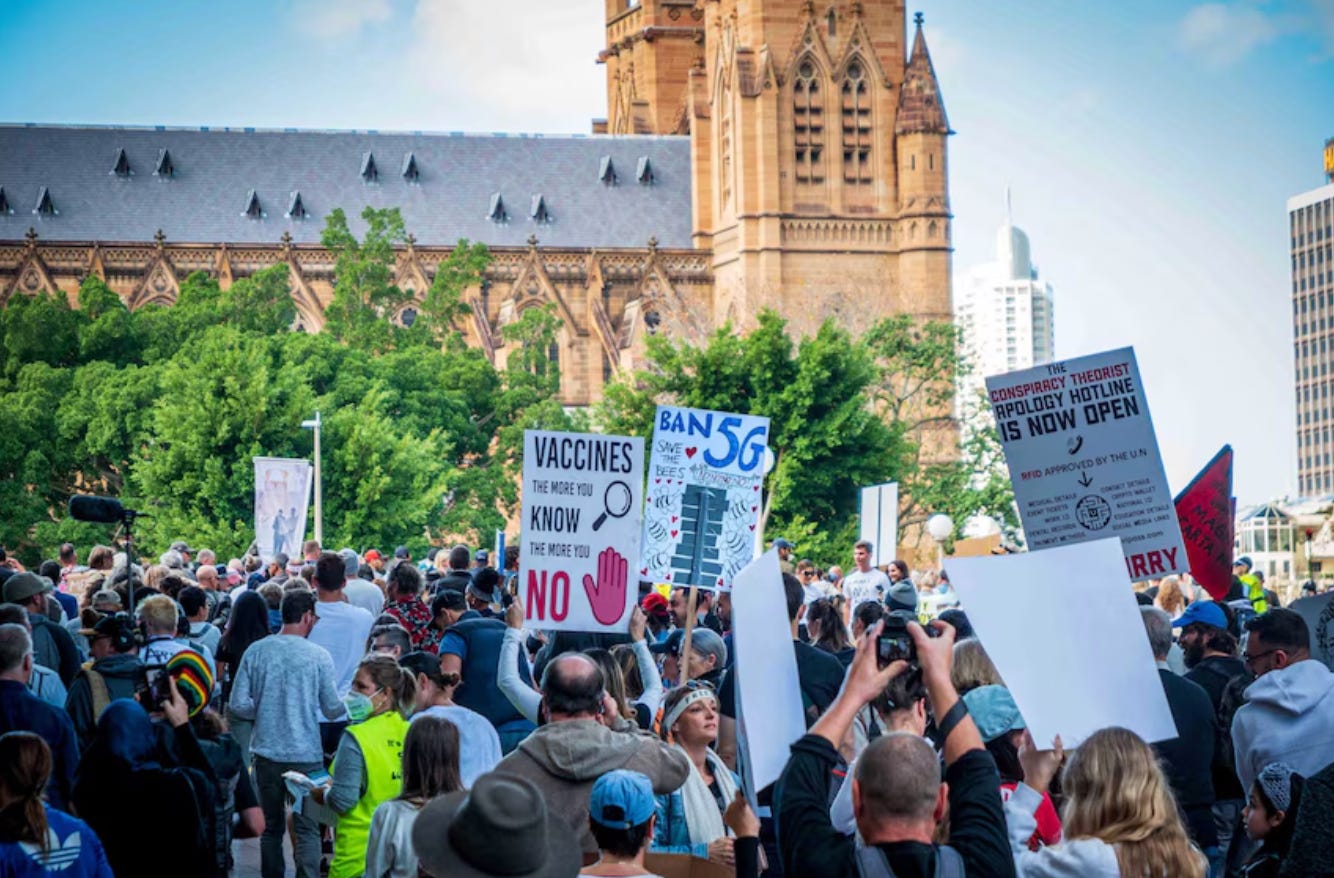
Then came January 6th, 2021.
Trump lost the 2020 election but refused to accept it. Dozens of courts, including the Supreme Court, looked at the claims and found NO evidence of fraud that could have changed the outcome. Even state election officials (including many Republicans) confirmed the vote was secure and fair.
But in Trump’s narcissistic mind, if he doesn’t win, the system MUST be rigged. He even said that months before the election, so we all knew it was coming.
“The only way we’re going to lose this election is if the election is rigged, remember that.”
– Donald Trump, April 2020 (source)
Basically, he said he would accept the results if the election isn’t rigged, but also claimed the only way he doesn’t win is if it is rigged.
So when he lost, he claimed fraud and told his supporters the election was “stolen” (as expected). And most of them believed it (still do). Then thousands of Trump supporters stormed the US Capitol, trying to stop Congress from certifying the election results.
It was a clear sign of just how bad things had gotten in the US. Trust in institutions was gone.
And what did we do? Not much. We just...moved on. Back to business as usual. Bidenomics!
Sure, congress held hearings and prosecutors opened cases. Trump was indicted multiple times over hush money, election interference, inciting insurrection, and hoarding classified documents. But none of it stopped him. None of it worked. His popularity among his base just grew. What does that mean? It’s a cult.
At the time, I just saw chaos and thought “How can so many people be this stupid?” I always knew people can be stupid, but I wasn’t ready for stupid to be in charge. And even though the world was clearly losing it, the only existential threat I was aware of was climate change. But I hadn’t read the science, just the mainstream articles, and I still saw it through a reductionist lens as solvable i.e. mostly a matter of cutting emissions and switching to renewables.
I also genuinely believed the economy could grow forever and technology could accomplish anything (no limits). So naturally, I figured this was just a rough patch, that with better leadership, technology and policies, we would eventually get back on track.
That changed in 2023.
I was on the path to financial independence, and like most people, my entire plan assumed growth would continue forever. That was the foundation of my future, security, and worldview.
So I ran the numbers, I projected my expenses, investment returns, and long-term scenarios. The usual 7% annual growth assumption kept showing up, and I asked myself: How solid is that, really?
“Historically, the U.S. stock market has returned about 10% per year on average before inflation, and around 7% after inflation.”
Where does this growth actually come from? What fuels production? What drives demand? What keeps this whole system running? The more I looked, the more the problems I found.
It became clear that this “historical” growth was anything but normal, and would be impossible to sustain. Because it was driven by three things:
Exponential extraction of cheap fossil energy (not sustainable)
Exponential growth of populations (not sustainable)
Exponential extraction of every resource we could find, some renewable, some non-renewable (not sustainable)
Killing the planet with a temporary surplus energy from fossil fuels is the foundation of our economic growth and consumer lifestyles. Once I saw that clearly, it was obvious this can’t last. The math doesn’t work.
At first, I thought I must have misunderstood something. It just seemed too big. “This is insane!” I thought. “How could all the banks, institutions, economists, politicians, everyone, be so terribly wrong? How could we have built a global system that's so obviously unsustainable?”
It was hard to believe, because every smart person I knew thought growth was good. All my university professors (PhDs, researchers, well-read and intelligent) took it as a given. We celebrate stock markets and GDP going up like that’s a sign of health. Even smart, well-meaning politicians promise to grow the economy like it’s the highest good.
So…is everyone wrong? Blind? Lying? Are they stupid? Not exactly. But somehow, despite all their intelligence and credentials, they never seem to question the core assumption.
And there I was, just a normal guy, sitting in disbelief, staring into a void that almost nobody else seemed to see.
Surely, the experts knew something I didn't. Right? RIGHT?!
WRONG.
I kept reading (list).
Limits to Growth by the Club of Rome, Overshoot by William R. Catton Jr., Immoderate Greatness by William Ophuls, The Collapse of Complex Societies by Joseph Tainter, and watched the The Great Simplification and There’s No Tomorrow.
I read the latest peer-reviewed climate science, learned about EROI, fossil fuels, resource depletion, freshwater stress, soil loss, biodiversity loss, ocean acidification, the water and carbon cycles, anthropology, ecology, carrying capacity, overshoot, paleoclimatology, planetary boundaries. Everything I could find.
I desperately wanted someone, anyone, to tell me I was wrong or overreacting. But when I went looking for that reassurance it wasn’t there. What I found was optimism bias, wishful thinking, reductionism, and denial. Almost no one was thinking in systems. Just endless faith in markets, progress, technology, and a deep refusal to admit there are limits.
That's when it happened. It was a complete psychological rupture. Like my mind broke open. The entire story I had been living in (progress, stability, endless growth) just collapsed.
I realized that infinite economic growth on a finite planet is a logical impossibility. But it’s not just growth that’s unsustainable, it’s our way of life. We will not be able to maintain this because it’s entirely based on depleting non-renewable resources, which is by definition unsustainable. And it’s so obviously suicidal it should be a goddamn joke, but for some reason it’s the core logic of every economy, government, bank, and institution.
I saw this civilization for what it truly is: unsustainable, extractive, pathological and built entirely on a one-time fossil fuel bonanza that’s already running out, meaning this way of life is coming to an end no matter what we do.
Our so-called solutions are mostly desperate attempts to keep this unsustainable system alive for a few more decades. To extend the life of a civilization that’s quite literally devouring and polluting the planet. For how long? 20, 30 years? Then what? What’s the plan after 2050? There is no plan.
When we talk about solutions we need to ask: what exactly are we trying to solve? A solution for what? To maintain business-as-usual (BAU) and preserve our lifestyles?
Because if the goal is to keep business-as-usual going with EV car culture, air travel, endless consumption, THEN WE’VE ALREADY FAILED. Because BAU is the problem. The system itself is the problem. Our high-energy, high-consumption way of life is the problem.
Any “solution” that tries to preserve our lifestyles is not a solution at all. It’s just a distraction, sold to us by the same system that’s killing us.
This is the insanity we live in.
As I put these pieces together, of course I lost faith in our current institutions and media, but unlike MAGA and other disillusioned groups it wasn’t because I thought they’re deliberately lying to us. No, it was because I could see that they aren’t thinking in systems. Most of them genuinely believe they’re doing the right thing by “growing the economy”. The problem is they’re stuck inside the same narrow worldview that’s driving us toward disaster.
And unlike conspiracy theorists I didn’t stop believing in science. In fact, science is exactly why I came to these conclusions, because it’s based on math, logic, evidence, and reason. That’s why it’s powerful and reliable.
Even some of the more extreme-sounding ideas like trying to delay climate change by stopping ice sheets from melting, can make sense mathematically and scientifically. But once you factor in physical limits, energy constraints, and the full system dynamics, most “solutions” fall apart.
We need to stop thinking of the current system as something fixed or inevitable. We made this system. We designed the rules. We can change them. There are real solutions, but first we need to admit the truth: the current system an ecological disaster (it’s killing us), fundamentally unsustainable (it will collapse anyway), and it makes people miserable (so why keep trying to preserve it?).
When it really hit me I remember going for a walk here in Chiang Mai and watched a Homo sapiens drive past me on a motorbike, thinking “How absurd is this? There goes a fire ape in synthetic clothes, riding a machine built from mined metals and ancient sunlight.”
Then I looked around and thought about what this place used to be. This exact spot was once a lush floodplain alive with teak, bamboo, and fig trees. Monsoon rains would swell the rivers feeding wetlands full of birds, reptiles, monkeys, elephants, and tigers.
Over centuries we destroyed it. We cut down the forests for materials, cleared the land for farms, houses, roads, and the sprawling, suffocating concrete of human infrastructure. We replaced a self-sustaining ecosystem with a monument to our own insatiable consumption.
It was a surreal experience. I had somehow slipped out of a shared hallucination and could finally see what was actually happening.
But nobody else seemed to notice or care. When I tried to explain it, even just a little bit, people looked at me like I was crazy. But how am I the crazy one for pointing out reality?
I felt completely disconnected. I wanted to know what had happened to me and why almost no one else can see it.
The Ego & Social Constructed Reality
To understand what was going on with me, I started looking into psychology and neuroscience. There are a lot of theories out there, but one thing is clear: we all carry around a strong internal sense of self. Some people call it the ego.
Carl Jung broke the psyche into several parts:
Ego – The “I” that thinks, worries, and tries to appear in control.
Persona – The mask you wear to fit in. You act different at work, with friends, and with family.
Shadow – The parts you hide: jealousy, fear, greed, anger, shame, selfishness.
Self – The whole you, including everything parts you don’t want to see.
Collective unconscious – Shared feelings and symbols all people seem to know deep down, even if they’re not aware of it.
You don’t need to memorize all that.
What matters is this: your ego is everything you’ve absorbed about who you are, how the world works and what’s “normal”. Think of it as a mental operating system made of beliefs, values, and habits, that helps us make sense of life and survive in the reality that we’re operating in.
But let’s step back and look at what we mean by “reality” first, and then look at how our sense of “normal” is shaped.
Two Realities: Built vs. Biophysical
We live in two different realities. One simply exists, working whether we believe in it or not. The other is a human invention.
There’s physical reality, which includes things like gravity, photosynthesis, thermodynamics, and water boiling at 100°C. These are laws of nature, understood through formal sciences like math and logic, a language for describing patterns and cause and effect. Natural sciences (physics, chemistry, biology, Earth science) are based on observation, experimentation, and evidence. This is how we build real knowledge. That’s why planes fly, phones work, and modern medicine exists.
The second is social reality, things like 7-day weeks, money, borders, laws, human rights, and nations. These are not physical facts, they are collective beliefs that function because we all agree on their meaning. Fields like economics, politics, and much of what’s called “social science” try to explain this invented world, but they’re not grounded in natural laws. For example, economics pretends to be science, but most of it is theory built on flawed assumptions like “humans are rational” or “infinite growth is possible”. It ignores physical limits.
Both realities shape our lives, but most people confuse the two because we’ve blurred the lines. We treat made-up things as if they’re laws of nature (especially economics), and ignore the actual laws of nature as if they’re optional.
It’s like we’re trying to legislate gravity out of existence, or declare that water boils at 50°C because it's more convenient. Sounds pretty stupid, right? That’s exactly what we’re doing.
“Reality is that which, when you stop believing in it, doesn't go away.”
– Philip K. Dick
The problem isn't that we create social constructs. We’ve done that for hundreds of thousands of years, and they're essential for organizing large, complex societies. Especially one’s with billions of people.
The problem is that our socially constructed reality is built on top of a non-negotiable foundation which is the physical world and its limits. It’s about energy, matter, and ecological limits. The laws of physics and thermodynamics. How much fresh water, metals, fossil fuels, and minerals Earth has. How energy moves through nature. How long it takes for soil to form, forests to grow back, or species to evolve.
These are non-negotiable limits.
Right now, our civilization is crashing headfirst into these biophysical limits. But instead of acknowledging these limits, we’re trying to bend reality to fit our imaginary systems. What we need to do is the opposite: reshape our human-made world to fit within the boundaries of the real one.
This disconnect between the socially constructed reality (which is made up) and biophysical reality (governed by non-negotiable natural laws) is the root of most of our problems today. From climate collapse to economic instability, we’re trying to run a civilization on beliefs that ignore the laws of nature.
How we experience and accept this social reality depends heavily on the environment we grow up in and the communities around us. In the next section, we’ll explore how our surroundings shape what we see as “normal” and why that matters so much.
The Conditioned Sense of "Normal"
Most of what we think of as “normal” takes shape very early in life. This early programming made sense for most of human history. For thousands of years, life barely changed from one generation to the next. Families passed down what they knew, and quickly learning the rules of your world was a survival advantage. You adapted once, and then carried that version of “normal” for life.
But today, where everything shifts every few years, that same early conditioning becomes a liability.
From the moment we're born, our nervous system starts soaking in everything around us and building our sense of “normal”. We copy the world we grow up in. Monkey see, monkey do.
As an infant, everything is just noise. Bit by bit we notice that making the sound “mamma” makes a certain face smile. That’s interesting. Our brain gives us a little hit of dopamine when something works. Eventually, we're speaking a human-invented language without choosing to, we just copied sounds of people around us and associate meaning to those sounds.
Then we watch how the people around us act and start doing the same. At home, we see how our parents talk to friends, how they act around strangers, how they treat money (very seriously), and how they talk about their jobs (very important). We see the five-day workweek, weekends, and the occasional vacation. We don’t question that, it’s just reality.
Many of our desires come from ads, TV shows, movies, music, parents, and friends. As kids, we want candy, cartoons, and toys. And we quickly learn those things cost money. Later, we want cars, phones, clothes, vacations, lifestyles. We want status. We want sex. We want approval. So we buy stuff. And to buy stuff, we need money.
We’re also picking up cultural narratives. We learn what food is normal (and what’s not), how to dress, what religion is “true”, what jokes are funny or offensive, what’s right and wrong, and what success or failure looks like.
But more than that, everyone reading this grew up during a unique time in history (the carbon pulse) where things got “better” and more convenient, at least on the surface…or so we were told.

New technologies appeared constantly (we went from VHS to DVD to Blu-ray to 4K streaming). Internet got faster, better and cheaper. Life became more convenient with more products on store shelves, more TV channels, new technology, cheaper flights and more destinations to travel to. And over time, that steady upward trend became baked into our idea of what’s “normal” i.e. people have (or had) an expectation that things just get better by default.
This unspoken “shared story” was fueled by fossil fuels, and shaped by industrial capitalism, pervasive media, consumer culture, and Western thought. It has led to two fundamental, but false, beliefs:
Endless growth is possible and always good.
Limits can be overcome with technology and growth.
These beliefs are taken as common sense.
And sure, growth seems rational inside this human-made world. It means more jobs and more money (for some), and it keeps the current system from crashing. Of course people want more money and prosperity. Ask anyone: Do you want more or less money? We all know the answer. And almost no one wants the economic system to implode because that would wipe out their savings, pensions, and their income. That’s the kind of “collapse” politicians are focused on avoiding, and frankly, the only kind they seem to understand.
And in our constructed reality, money decides where you live, what you eat, how safe you are, and what kind of life you get. You can trade it for food, fuel, electricity, housing, healthcare, breast implants, or a private jet. Whatever you want.
So it makes perfect sense that people, including our dear leaders, believe that growth is inherently good, because it means less poverty.
And if you don’t recognize limits (most people don’t), if you think money runs the world and technology can solve anything (most people do) then it’s completely rational to believe things like “We can solve [problem] with more money and better technology.”
But that’s not how the real world works and none of this is “normal”.
Money is just a promise or claim on those real things. Energy does the work, things are built from materials (resources), and ecosystems keep us alive. We could print a gazillion dollars or give everyone a million dollars tomorrow, but it wouldn’t change how much lithium, oil, topsoil, or fresh water exists on this planet.
And what we think is normal was put in our heads by our parents, teachers, friends, government, and media. This conditioning, which really depends on when and where you grew up, shapes a huge part of who we are and what we think is “normal”.
To prove the point, imagine you were adopted as a baby by a muslim family in Saudi Arabia. You would still be you (same DNA, body, and brain), but your worldview would be completely different, right? You would have a different name, speak and think in Arabic, practice Islam, consider alcohol a sin, maybe believe homosexuality is immoral, and think Western culture is morally bankrupt (okay, maybe not wrong on that one).
Now imagine being born at a different point in history. Let’s say as a peasant in 14th-century Europe. Your "normal" would revolve around the seasons, probably some local lord, the village church, and the constant fear of not having enough food or getting sick and dying. You wouldn’t really expect your life to improve. And your children would expect to live the same way, as peasants.
In short, we’ve lived through an exceptional moment in history, and our brains have mistaken it for normal. Now that those conditions are slipping away, we’re struggling. Our expectations no longer match reality, and that disconnect is causing a lot of confusion and frustration, leading to denial and growing conspiracy thinking.
To understand why denial is the natural response, we first need to understand why our ego formed, and what it’s trying to protect.
The Dawn of Worry & Defense Mechanisms
At some point in our evolution, humans became self-aware. We started making tools, developed complex language, and somewhere along the way we realized: I exist. And one day I won’t.
Most animals don’t face this dilemma, they live in the now. A zebra can stand a few meters from a lion and stay calm. It only freaks out when the lion actually charges. Then stress hormones flood its system, it runs for its life, and if it escapes, two minutes later it’s calm again back to chewing grass like nothing happened.
Our stress system was built for similar short-term physical threats. But when we became self-aware we hijacked that system to deal with abstractions. We started asking questions “What is this? What happens if…?” and began thinking about ourselves and what might happen today, tomorrow, next week, or after we’re dead.
And that came with some side-effects.
We became aware of death, loss, failure, and everything that could go wrong. This means we have the capacity to worry (sometimes a lot) about things that haven’t even happened yet. Meaning we live in a constant state of low-level anxiety, because we’re scared of what might be coming. That includes the collapse many of us haven’t fully faced yet. We're imagining future scenarios inside our brains.
To handle this anxiety, the brain made a kind of mental shield.
It protects us from things that threaten our sense of self and our view of the world (what we think is normal). When something doesn’t fit, the ego doesn’t try to understand. It deploys defense mechanisms:
Denial: Refusing to accept uncomfortable truths
Rationalization: Making excuses or justifying beliefs
Minimization: Downplaying the severity of a problem
Projection: Blaming others for our own issues
Compartmentalization: Pushing truths out of awareness
These mental defenses helped humans survive for thousands of years. We evolved as social animals, wired to cooperate, trust, and believe in shared myths because for most of human existence, being kicked out of your tribe meant death. That’s why our brains evolved to prioritize social belonging over truth.
But now they’re protecting a fantasy world built on infinite growth, money, control, and consumption. A worldview we’ve all been conditioned to believe is “normal”. But it’s an ecocidal fantasy. One that the ego is designed to protect at all costs.
So if you’ve ever wondered why people can’t be reasoned with, why facts don’t change minds, why people double down when presented with evidence, it’s because we are designed to believe what our tribe believes.
Now fast-forward to today. People live in algorithm-fed echo chambers (the new digital tribes) and our sense “normal” is falling apart. Nothing fits the story we were told. Our brain doesn’t like that.
When faced with our terrifying reality, the mind quickly goes looking for something that makes it all feel okay again. Maybe it’s Fox News saying it’s all a hoax. Or Bjorn Lomborg saying climate change isn’t such a big deal. Or maybe it’s a TED Talk promising that AI and solar panels will fix everything. Or a book called Abundance or Not the End of the World whispering comforting lies in your ear.
And just like that, you’re back asleep. The illusion is intact. The dream continues.
But staying asleep is getting harder without falling into conspiracy thinking because to maintain the illusion of normal you have to create an alternate reality to explain away all these obvious symptoms of systemic breakdown. And to keep that fantasy alive, you must reject anything that threatens it, including science, evidence, and basic logic.
That’s why denial of climate change keeps growing even as climate breakdown becomes extremely obvious. We get ridiculous ideas like Jewish space lasers, hurricane machines, and chemtrails. These wild fantasies explain the symptoms of climate breakdown without accepting climate change itself. If it’s not my fault, then I don’t have to change.
Anything but the truth!
They’re seriously implying that 99% of climate scientists across every country, university, and research lab, are all in on some giant global conspiracy to… what? Get rich? From who?
“Follow the money” they say. Okay, let’s do that.
The only climate scientists getting big money are the very few who deny it, and they’re funded by fossil fuel companies and libertarian think tanks with billions of dollars and every reason to delay action.
If climate change were a hoax, every climate scientist would gladly accept millions from Exxon, Shell, or Koch Industries simply to tell the truth. Why would 99% of scientists lie so they can make less money? That makes no sense. Fossil fuel companies are desperate for it not to be real and they’re filthy rich. There’s no funding shortage. So why haven’t more scientists taken the money just to “tell the truth”?
Here’s the real conspiracy: fossil fuel companies knew. Exxon’s own scientists predicted modern warming back in the 70’s. They buried the science and spent millions on denial campaigns. It’s right there in the link.
Another narrative (often from the far-right) is that climate action is a “plan to control us”. Really?
Climate scientists are not running our governments and are not saying “Everyone must buy an EV and adopt these specific measures”. They’re saying the science is clear and we should stop emitting greenhouse gases or the warming will accelerate. That’s it.
The fact that politicians and corporations decided to capitalize on climate change (shocking) and push EV’s, carbon capture, solar, wind etc. is a response to the scientific consensus and a desperate attempt to maintain BAU. But that does not mean the science is wrong.
Governments have mostly failed to listen to scientists, preferring to listen to economists instead. They haven’t passed serious climate policies. They have done almost NOTHING about climate change. There are no real carbon taxes, no bans on gas cars in most places, and no limits on consumption.
So what exactly is this “control” these people are talking about? Where is it?
The Unraveling of Shared Reality
I’m sure you’ve had this experience: someone close to you, maybe a family member, a friend, or even your partner, is living in another reality. They’re deep into conspiracies, saying things completely detached from what you know to be true.
From your perspective, they’re denying facts and living in a fantasy. But if you ask them, they probably think you’re the one who’s blind, hysterical, brainwashed, and naive. Sound familiar?
This is what happens when everyone gets their own feed, their own facts, and their own “truth”. It doesn’t matter if what they’re seeing is objectively true or total bullshit, the algorithms don’t care. They just push whatever keeps people scrolling and makes money. No editors. No fact-checkers. No shared reality. Just profit-driven dopamine.
This complete breakdown in our ability to agree on basic facts is one of the clearest signs that we’re already living through the early stages of societal collapse. It’s like watching a slow, stupid faceplant in real time.
The unraveling is here and our response is painfully stupid and short-sighted. We’re not even bothering to name most of the existential threats staring us in the face: climate chaos, mass extinction, resource depletion, economic instability, increasing risk of collapsing health and food systems. Instead, we’re denying reality and still chasing economic growth.
Around the world, facts no longer seem to matter. This opened the door for far-right movements to rise by offering simple answers to complex problems, flooding the public with misinformation, rejecting science, spinning false narratives, and distracting from the systemic breakdown happening all around.
This is how overshoot feeds authoritarianism. It’s not that most people crave fascism or oppression, they just want their “normal” back. They want the comfortable lifestyles they once had. Authoritarian leaders promise fast, easy fixes, even if those solutions are cruel, dishonest, or doomed to fail.
History makes one thing clear: it never ends well. And by the time people realize what they’ve signed up for, it’s usually far too late…
The Emergence of the Self
For some of us the truth becomes too obvious and undeniable. Something breaks you open, like it did for me. Carl Jung said real awakening happens through crisis, and waking up to our predicament is one of the deepest psychological ruptures a person can experience. Losing your “normal” means the ground beneath your feet shifts. It kills all the stories you’ve been telling yourself, and denial no longer works.
When the old story dies, you start seeing the world as it really is.
This process is often called ego death, but that phrase is a bit misleading. Our sense of self doesn’t go away, and your brain doesn’t stop simulating “you”. What changes is you become aware of your ego, and see it for what it really is: a story, a mask, a conditioned performance.
“The moment you become aware of the ego in you, it is strictly speaking no longer the ego, but just an old, conditioned mind-pattern. Ego implies unawareness. Awareness and ego cannot coexist.”
– Eckhart Tolle
In Jungian psychology, that rupture, the moment everything stops making sense, is the start of individuation. The long and painful process of uncovering the Self, and becoming the real you.
When that happens, you start feeling different. You lose interest in the game everyone else is playing. Things that used to matter like work, money, and chasing goals, don’t feel important anymore. Being in an office, or a Zoom meeting about “increasing sales” or “optimizing conversion rates” feels surreal. Like you’re trapped in a fake world where everyone’s pretending.
You sit there thinking “Are we seriously still wasting time on this bullshit?” because the pretending becomes unbearable. What you actually want is to quit, walk away and smash your laptop.
Some relationships won’t survive this shift. You sit with friends or family and listen to them complain about their job, traffic, climate protesters blocking roads, the price of flights or gas or groceries. They talk about some trivial TV show they’re addicted to, their investments, retirement plans, and their next vacation.
You just sit there, nod politely, but inside you're thinking: None of this makes any fucking sense. Because it doesn’t.
What you feel, whether it’s anxiety, confusion, grief or anger, is a sane response to a species in collective hypnosis, barreling toward self-destruction. Your emotions match the reality of the world you live in, and how hard you’ve been pretending to seem functional in a society that suffers from the denial of reality.
Eventually, after all the grief and frustration, something else starts to come through. It’s a quieter kind of awareness that doesn’t care about status, productivity, performance, or what other people think. It just observes.
You start noticing small things you used to overlook like birdsong in the morning, how the wind moves through the trees, ants carrying crumbs, or a gecko warming itself on the pavement. You notice rust spreading on old bridges, buildings decaying, and cracks forming in roads that no one seems to fix.
This shift in awareness is the emergence of ecological consciousness. A recognition that you’re not separate from nature, you are nature. When the Earth suffers, you feel it. It’s like a voice rising from your bones and blood. A whisper from the collective unconscious reminding you who you truly are.
Some people have always carried this awareness. Having it doesn’t mean you fully understand every part of our predicament, but once you do understand, this connection becomes impossible to ignore.
I used to see everything through an economic lens: is this good for growth? Is it profitable? I mostly thought about money, work, and what to buy next. How to fill the void. I tried to fill it with consumption, goals, accomplishments, and status. Always chasing something, always needing more, and never feeling satisfied for more than a few minutes.
But then that void got smaller and my attention shifted.
Now I pay attention to the natural world. I see the world as one vast, connected system, where everything affects everything else. And most mornings I wake up perfectly happy. Despite everything I know about the world, it doesn’t weigh me down like it used to. It’s just part of me now, something I live with.

As the collapse unfolds, it’s worth remembering that while our conclusions are based on systems thinking, biophysical limits, and hard data, the future hasn’t happened yet. Which means uncertainty, assumptions, and blind spots. So don’t let waking up to reality turn into giving up.
However, a few things are very clear, in the decades to come we’re going to have less energy, climate chaos, and lifestyles that are much simpler and fundamentally local. That’s the best-case scenario, if we have a future. And whether you realize it or not, you’re already preparing for it.
The unraveling is already happening, and now each of us has a choice: wake up or disappear into delusion.
You’ve already made your choice, you’re out of the hypnosis.
And that’s liberation.




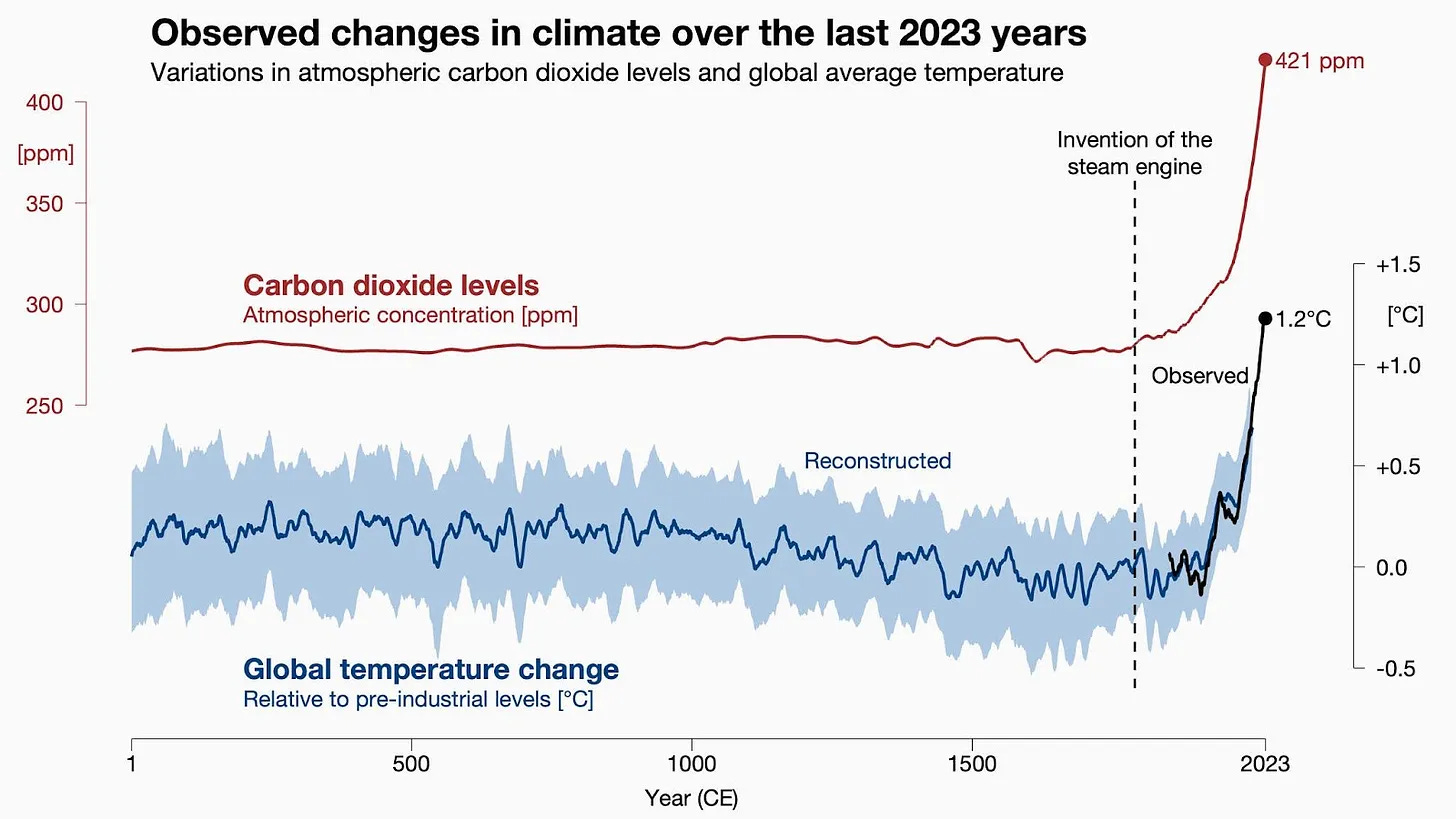




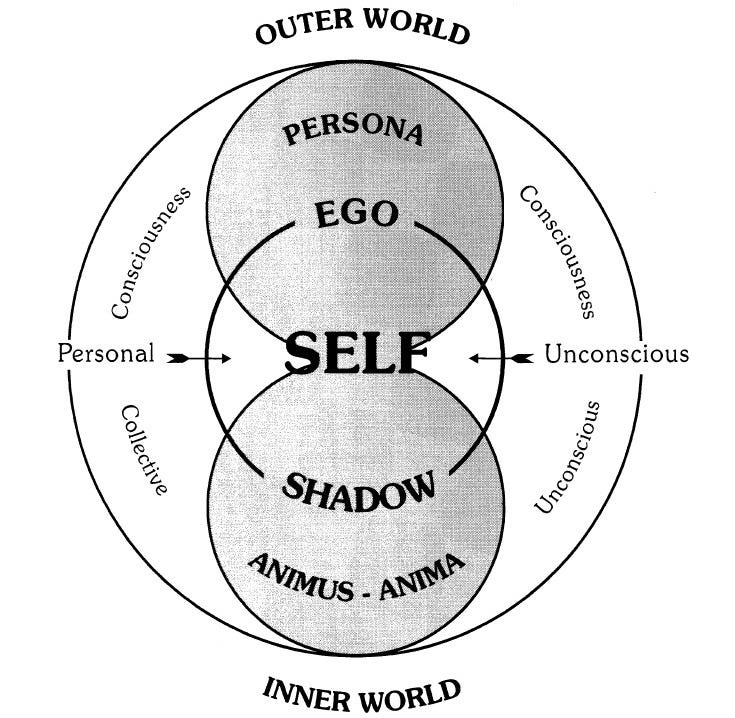
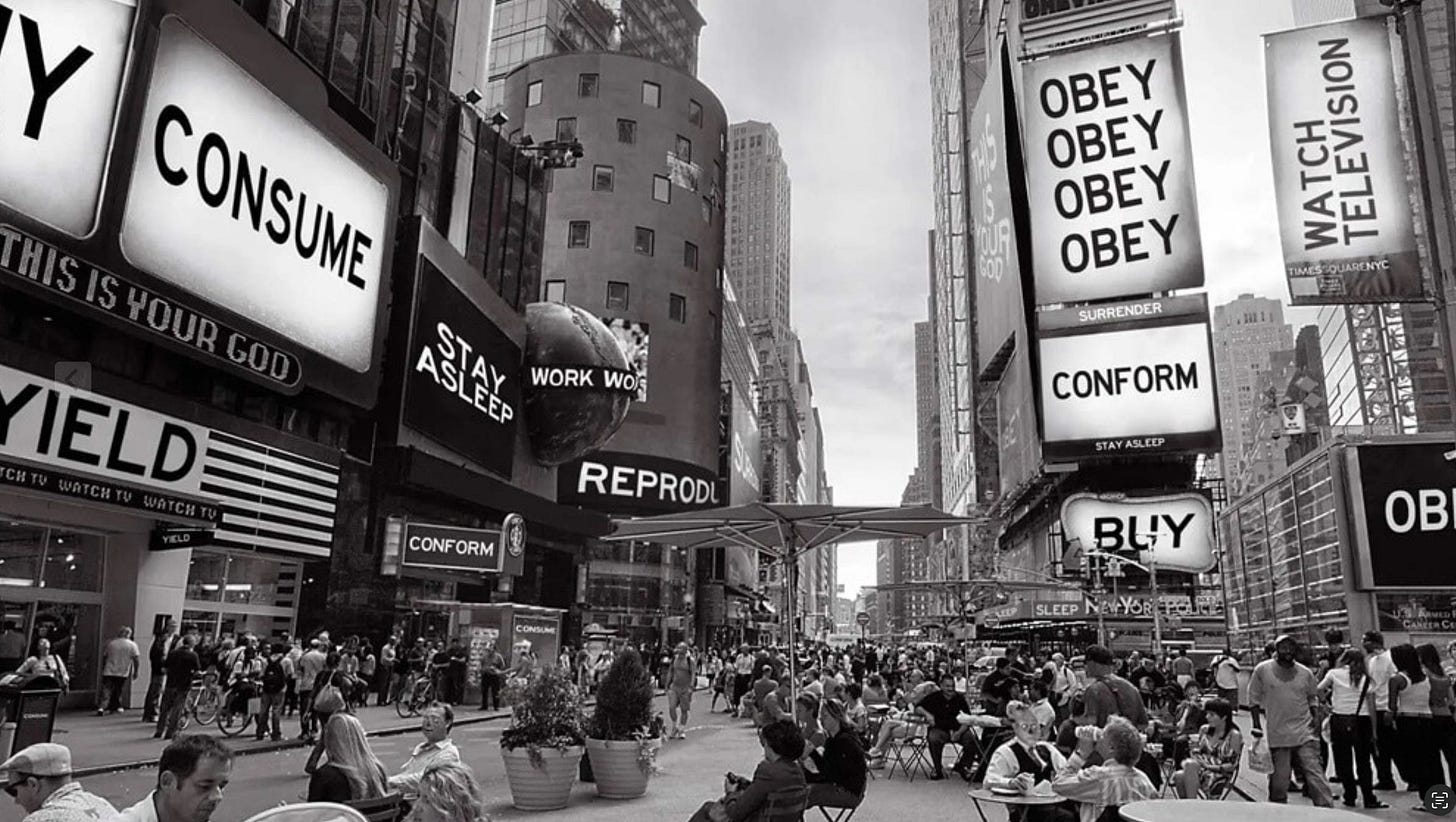

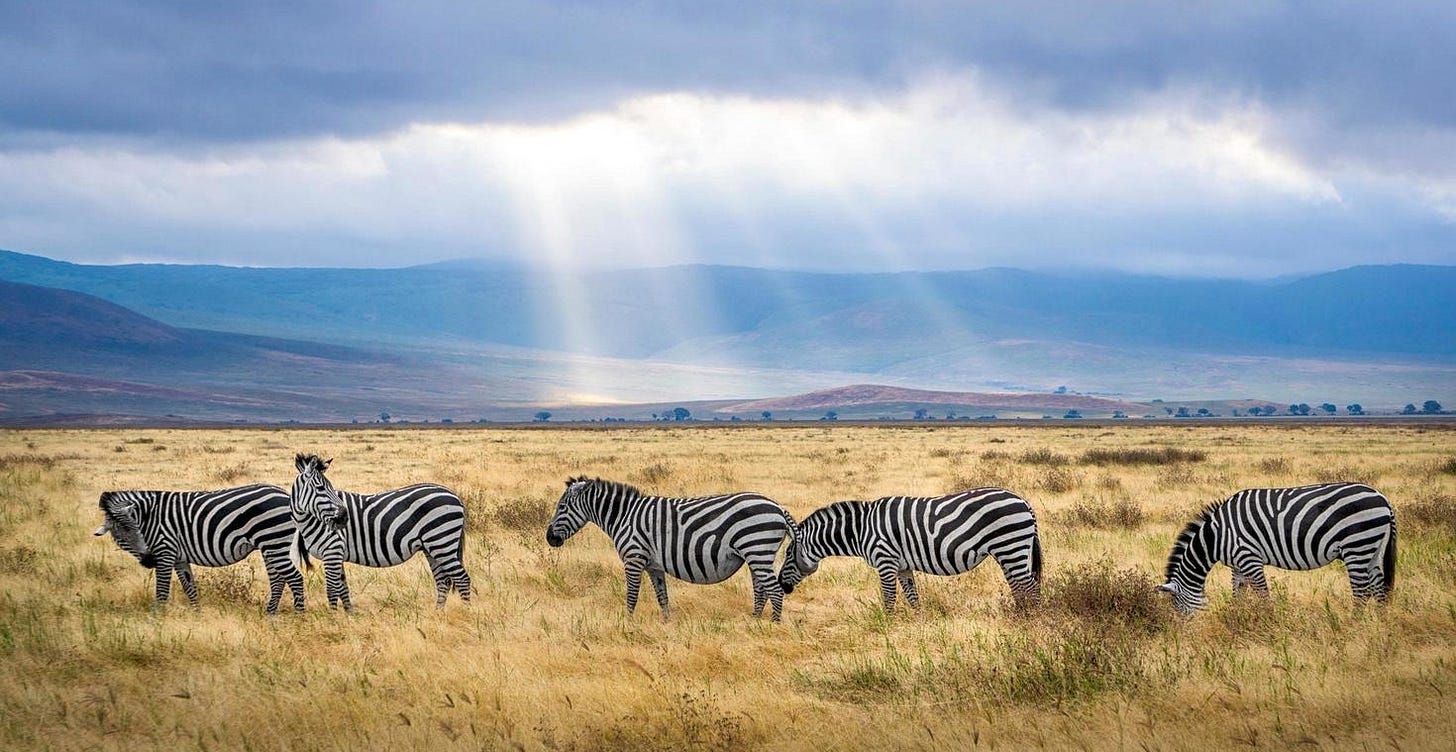
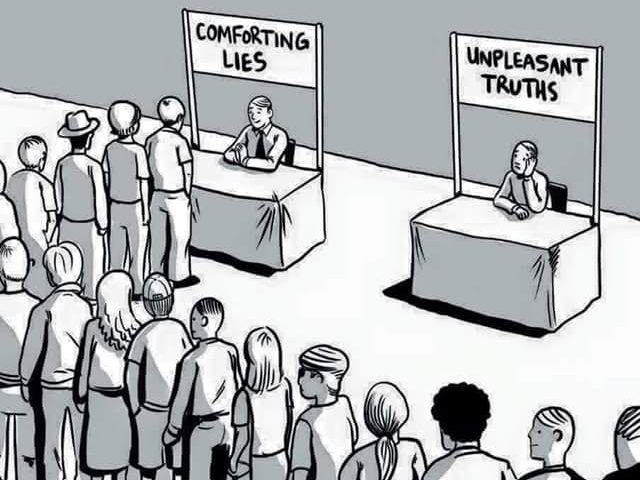

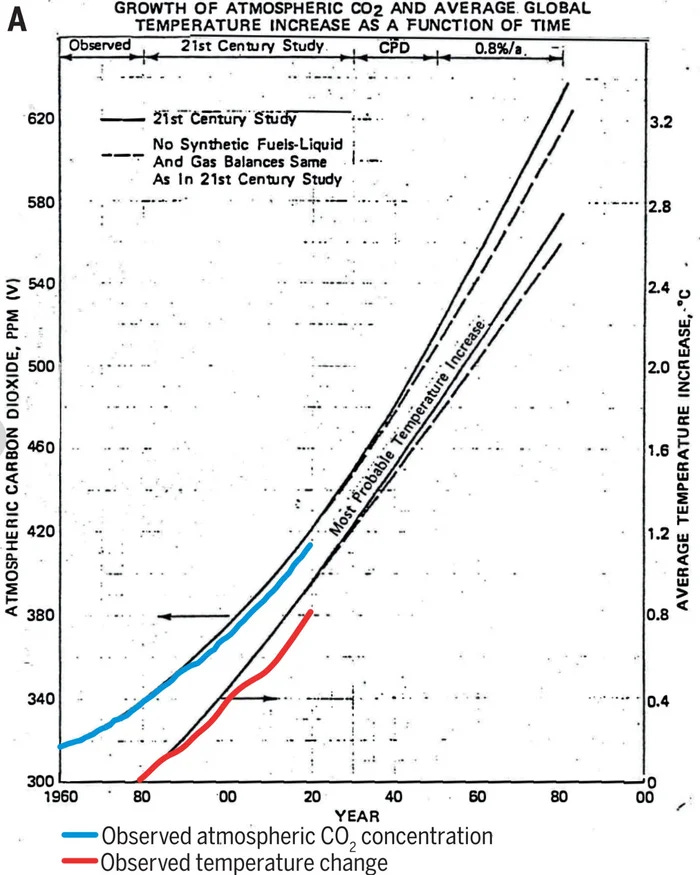
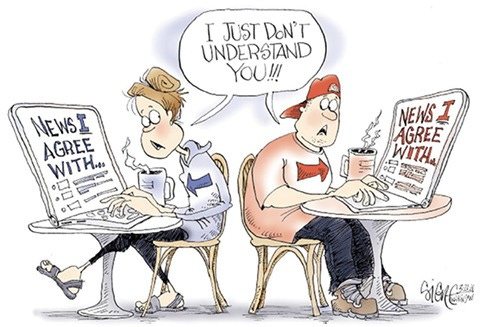

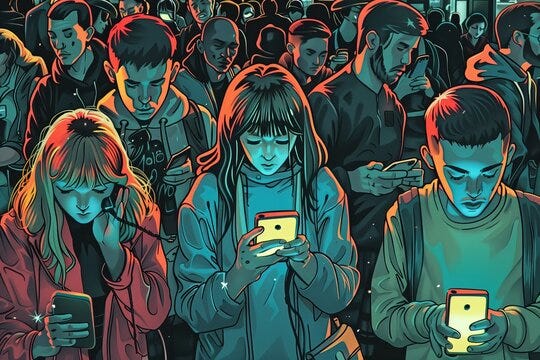
Yes! I’m old and have been through many of these stages. I’m impressed at how elegantly you write about it without getting lost. And I appreciate the hopeful ending. One of my concerns in all this is the extinction of species. It’s so unfair.
It befuddles my mind to realize that among all this prosperity and progress how many people are moving back to the dark ages when people didn’t understand an eclipse and attributed it to the supernatural. That’s how I feel about the people that believe outlandish conspiracy theories. I never expected it in my lifetime. But here it is.
Outstanding, insightful summary of the situation in which we find ourselves. It greatly heartens me to find someone that has come to essentially the same conclusions about this world around us, how we got here, and where we are likely headed. I'm not alone.